Comprehensive Analysis of Saudi Healthcare Policy and Stakeholders
VerifiedAdded on 2022/10/12
|8
|1731
|60
Report
AI Summary
This report provides a comprehensive analysis of the healthcare policy in Saudi Arabia, focusing on the various stakeholders involved in its delivery and reform. It identifies key stakeholders such as patients, the government, competitors (including private hospitals and insurance companies), suppl...
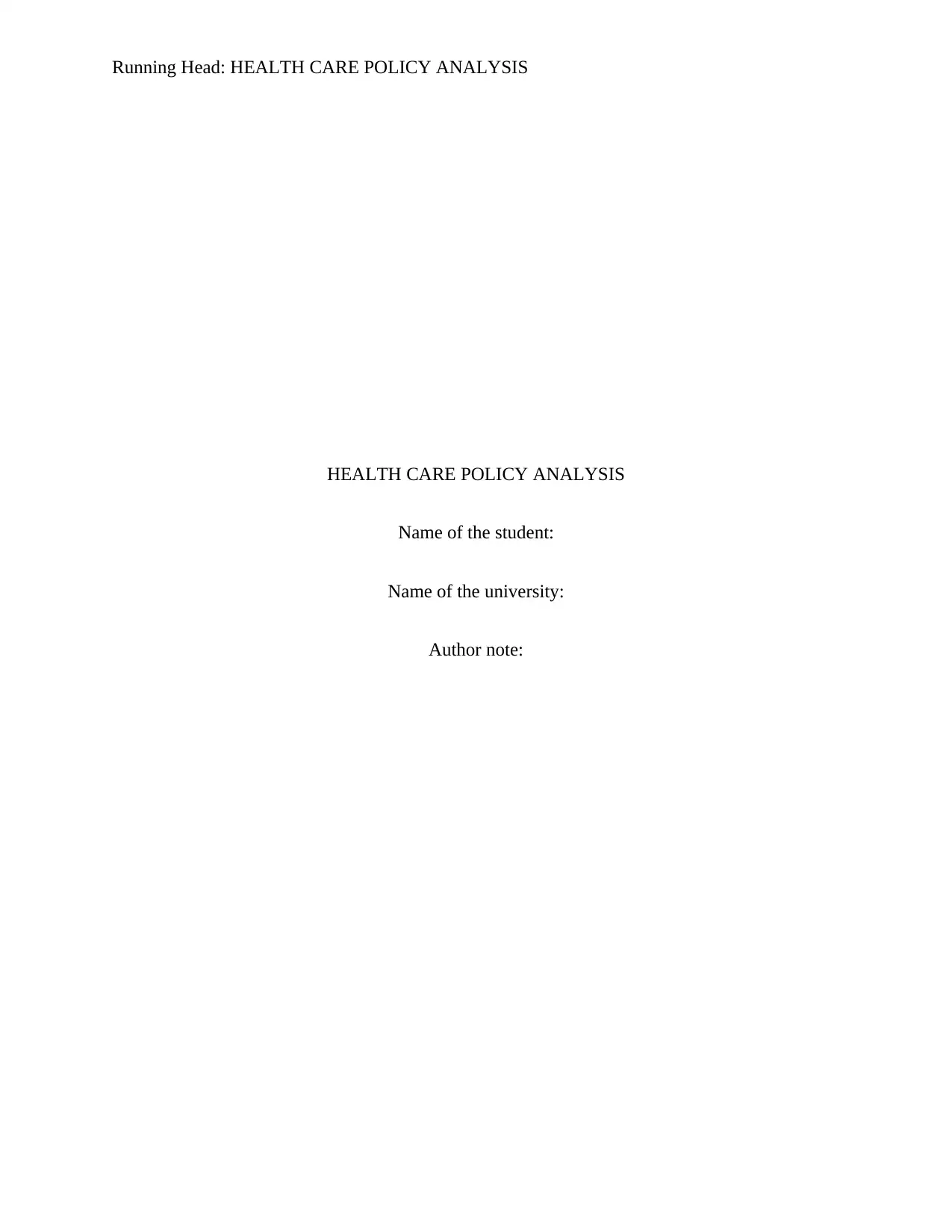
Running Head: HEALTH CARE POLICY ANALYSIS
HEALTH CARE POLICY ANALYSIS
Name of the student:
Name of the university:
Author note:
HEALTH CARE POLICY ANALYSIS
Name of the student:
Name of the university:
Author note:
Paraphrase This Document
Need a fresh take? Get an instant paraphrase of this document with our AI Paraphraser
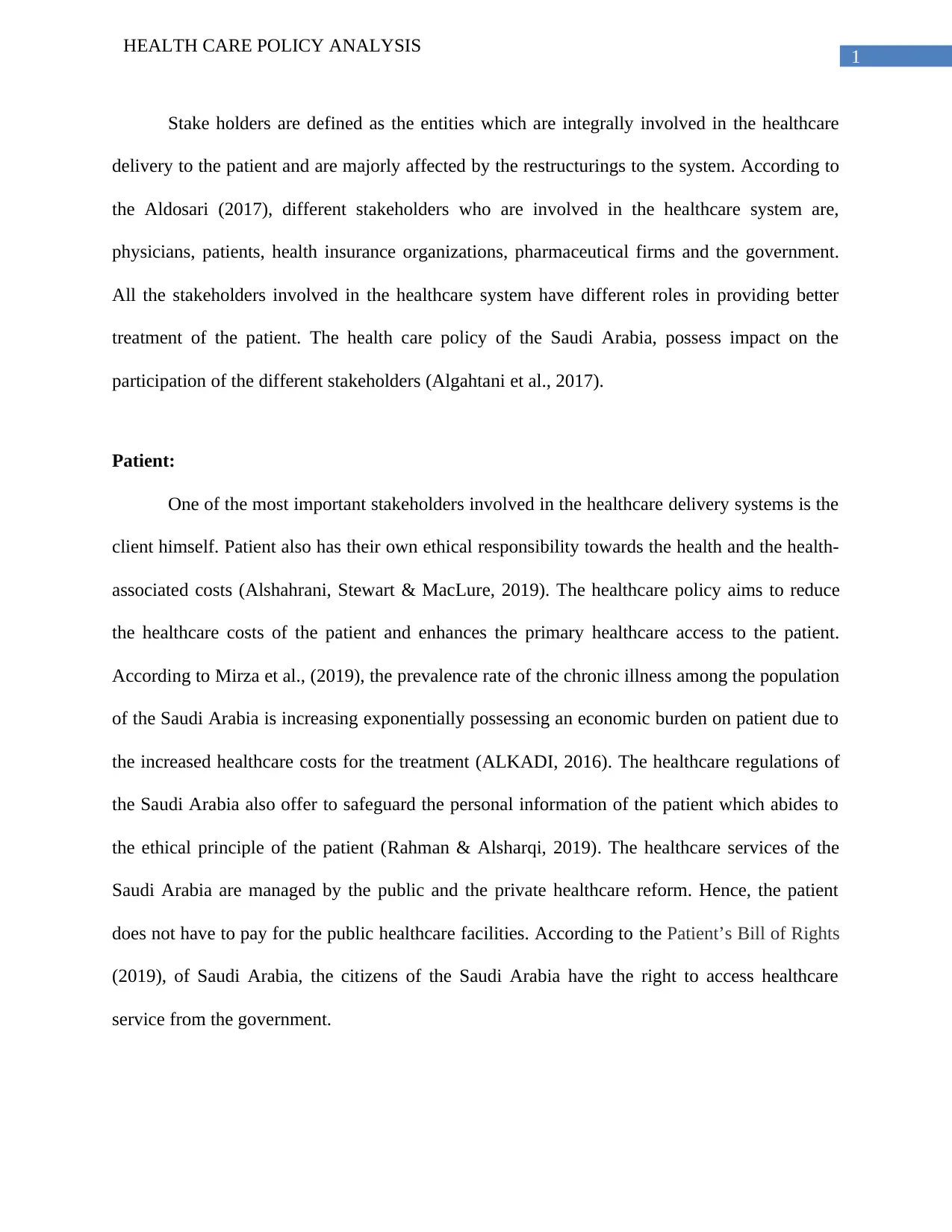
1
HEALTH CARE POLICY ANALYSIS
Stake holders are defined as the entities which are integrally involved in the healthcare
delivery to the patient and are majorly affected by the restructurings to the system. According to
the Aldosari (2017), different stakeholders who are involved in the healthcare system are,
physicians, patients, health insurance organizations, pharmaceutical firms and the government.
All the stakeholders involved in the healthcare system have different roles in providing better
treatment of the patient. The health care policy of the Saudi Arabia, possess impact on the
participation of the different stakeholders (Algahtani et al., 2017).
Patient:
One of the most important stakeholders involved in the healthcare delivery systems is the
client himself. Patient also has their own ethical responsibility towards the health and the health-
associated costs (Alshahrani, Stewart & MacLure, 2019). The healthcare policy aims to reduce
the healthcare costs of the patient and enhances the primary healthcare access to the patient.
According to Mirza et al., (2019), the prevalence rate of the chronic illness among the population
of the Saudi Arabia is increasing exponentially possessing an economic burden on patient due to
the increased healthcare costs for the treatment (ALKADI, 2016). The healthcare regulations of
the Saudi Arabia also offer to safeguard the personal information of the patient which abides to
the ethical principle of the patient (Rahman & Alsharqi, 2019). The healthcare services of the
Saudi Arabia are managed by the public and the private healthcare reform. Hence, the patient
does not have to pay for the public healthcare facilities. According to the Patient’s Bill of Rights
(2019), of Saudi Arabia, the citizens of the Saudi Arabia have the right to access healthcare
service from the government.
HEALTH CARE POLICY ANALYSIS
Stake holders are defined as the entities which are integrally involved in the healthcare
delivery to the patient and are majorly affected by the restructurings to the system. According to
the Aldosari (2017), different stakeholders who are involved in the healthcare system are,
physicians, patients, health insurance organizations, pharmaceutical firms and the government.
All the stakeholders involved in the healthcare system have different roles in providing better
treatment of the patient. The health care policy of the Saudi Arabia, possess impact on the
participation of the different stakeholders (Algahtani et al., 2017).
Patient:
One of the most important stakeholders involved in the healthcare delivery systems is the
client himself. Patient also has their own ethical responsibility towards the health and the health-
associated costs (Alshahrani, Stewart & MacLure, 2019). The healthcare policy aims to reduce
the healthcare costs of the patient and enhances the primary healthcare access to the patient.
According to Mirza et al., (2019), the prevalence rate of the chronic illness among the population
of the Saudi Arabia is increasing exponentially possessing an economic burden on patient due to
the increased healthcare costs for the treatment (ALKADI, 2016). The healthcare regulations of
the Saudi Arabia also offer to safeguard the personal information of the patient which abides to
the ethical principle of the patient (Rahman & Alsharqi, 2019). The healthcare services of the
Saudi Arabia are managed by the public and the private healthcare reform. Hence, the patient
does not have to pay for the public healthcare facilities. According to the Patient’s Bill of Rights
(2019), of Saudi Arabia, the citizens of the Saudi Arabia have the right to access healthcare
service from the government.
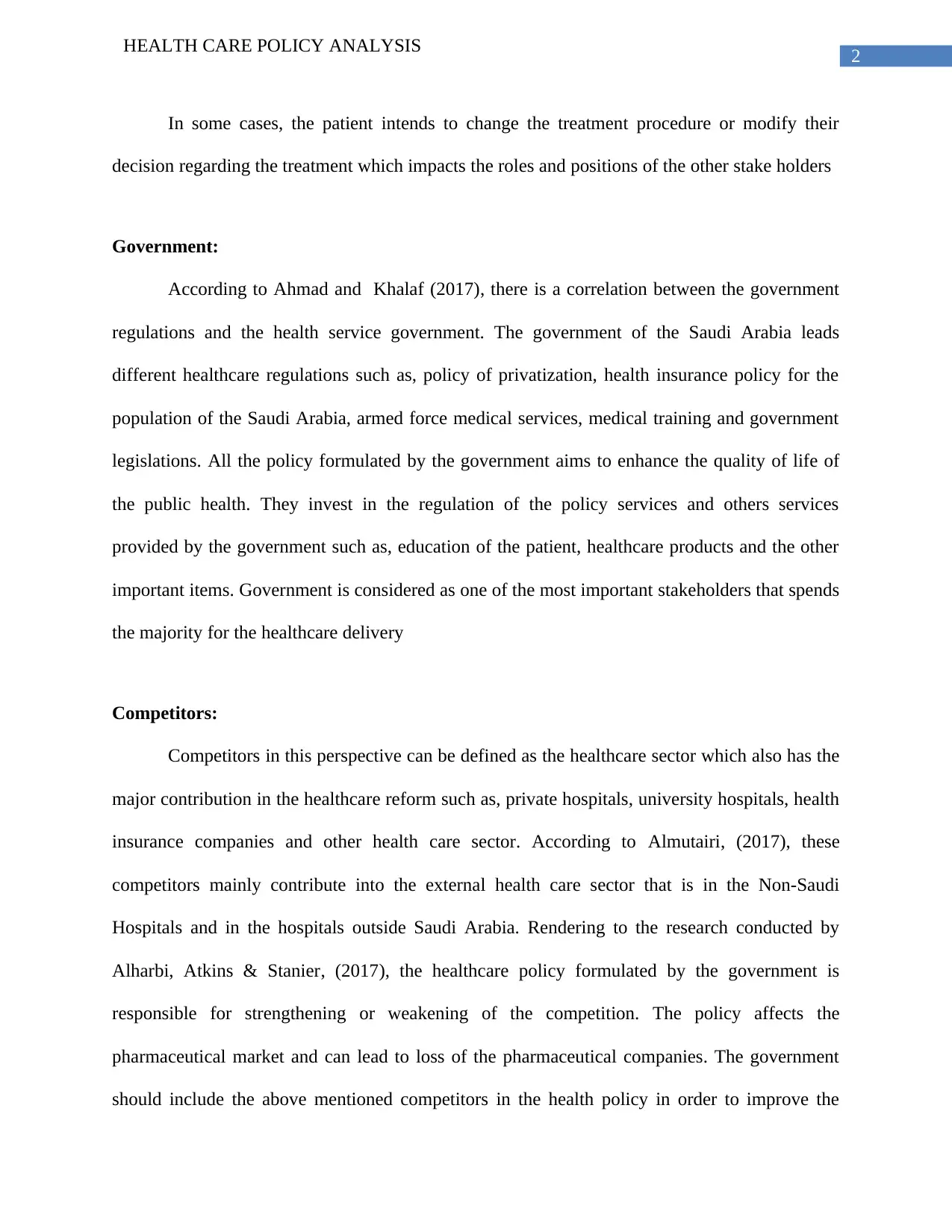
2
HEALTH CARE POLICY ANALYSIS
In some cases, the patient intends to change the treatment procedure or modify their
decision regarding the treatment which impacts the roles and positions of the other stake holders
Government:
According to Ahmad and Khalaf (2017), there is a correlation between the government
regulations and the health service government. The government of the Saudi Arabia leads
different healthcare regulations such as, policy of privatization, health insurance policy for the
population of the Saudi Arabia, armed force medical services, medical training and government
legislations. All the policy formulated by the government aims to enhance the quality of life of
the public health. They invest in the regulation of the policy services and others services
provided by the government such as, education of the patient, healthcare products and the other
important items. Government is considered as one of the most important stakeholders that spends
the majority for the healthcare delivery
Competitors:
Competitors in this perspective can be defined as the healthcare sector which also has the
major contribution in the healthcare reform such as, private hospitals, university hospitals, health
insurance companies and other health care sector. According to Almutairi, (2017), these
competitors mainly contribute into the external health care sector that is in the Non-Saudi
Hospitals and in the hospitals outside Saudi Arabia. Rendering to the research conducted by
Alharbi, Atkins & Stanier, (2017), the healthcare policy formulated by the government is
responsible for strengthening or weakening of the competition. The policy affects the
pharmaceutical market and can lead to loss of the pharmaceutical companies. The government
should include the above mentioned competitors in the health policy in order to improve the
HEALTH CARE POLICY ANALYSIS
In some cases, the patient intends to change the treatment procedure or modify their
decision regarding the treatment which impacts the roles and positions of the other stake holders
Government:
According to Ahmad and Khalaf (2017), there is a correlation between the government
regulations and the health service government. The government of the Saudi Arabia leads
different healthcare regulations such as, policy of privatization, health insurance policy for the
population of the Saudi Arabia, armed force medical services, medical training and government
legislations. All the policy formulated by the government aims to enhance the quality of life of
the public health. They invest in the regulation of the policy services and others services
provided by the government such as, education of the patient, healthcare products and the other
important items. Government is considered as one of the most important stakeholders that spends
the majority for the healthcare delivery
Competitors:
Competitors in this perspective can be defined as the healthcare sector which also has the
major contribution in the healthcare reform such as, private hospitals, university hospitals, health
insurance companies and other health care sector. According to Almutairi, (2017), these
competitors mainly contribute into the external health care sector that is in the Non-Saudi
Hospitals and in the hospitals outside Saudi Arabia. Rendering to the research conducted by
Alharbi, Atkins & Stanier, (2017), the healthcare policy formulated by the government is
responsible for strengthening or weakening of the competition. The policy affects the
pharmaceutical market and can lead to loss of the pharmaceutical companies. The government
should include the above mentioned competitors in the health policy in order to improve the
⊘ This is a preview!⊘
Do you want full access?
Subscribe today to unlock all pages.

Trusted by 1+ million students worldwide
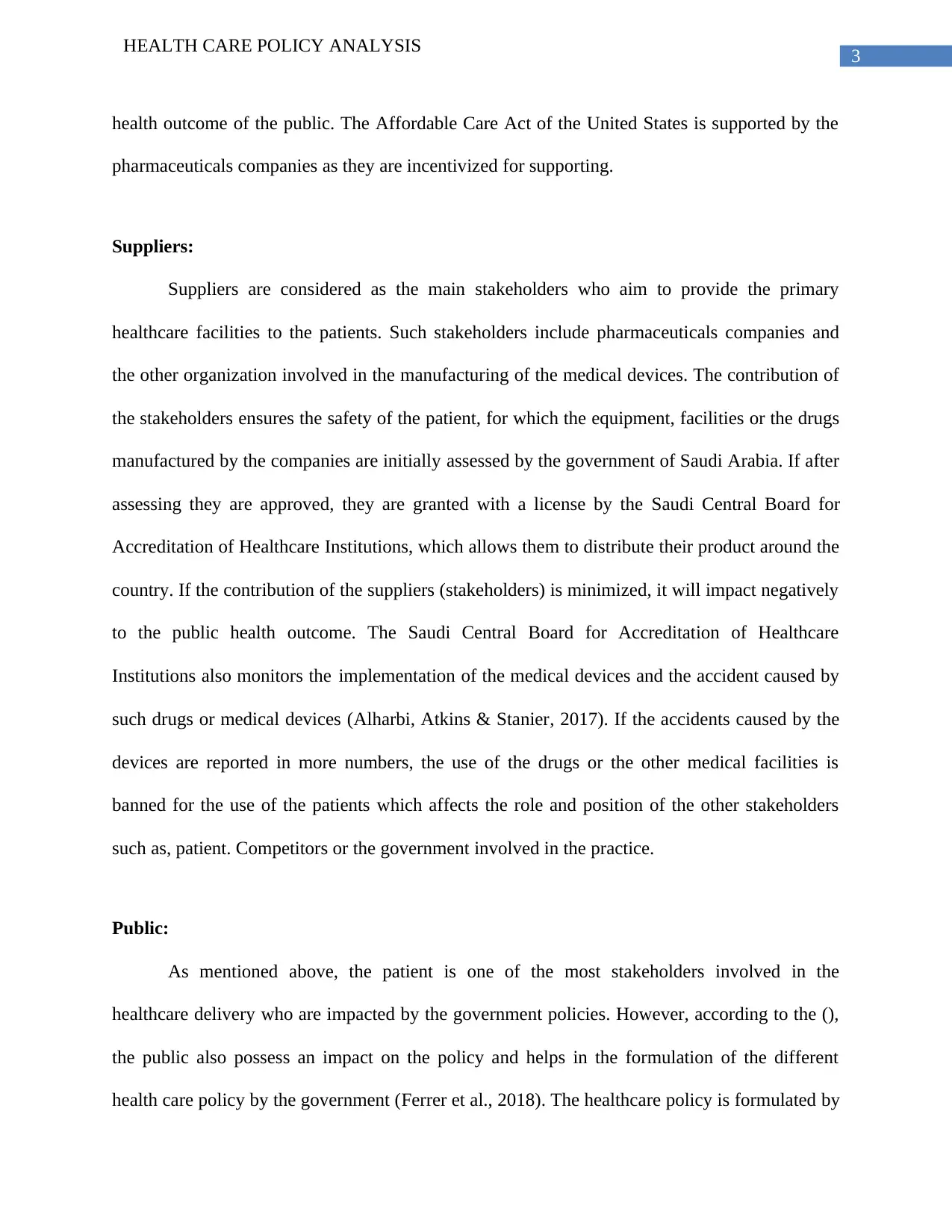
3
HEALTH CARE POLICY ANALYSIS
health outcome of the public. The Affordable Care Act of the United States is supported by the
pharmaceuticals companies as they are incentivized for supporting.
Suppliers:
Suppliers are considered as the main stakeholders who aim to provide the primary
healthcare facilities to the patients. Such stakeholders include pharmaceuticals companies and
the other organization involved in the manufacturing of the medical devices. The contribution of
the stakeholders ensures the safety of the patient, for which the equipment, facilities or the drugs
manufactured by the companies are initially assessed by the government of Saudi Arabia. If after
assessing they are approved, they are granted with a license by the Saudi Central Board for
Accreditation of Healthcare Institutions, which allows them to distribute their product around the
country. If the contribution of the suppliers (stakeholders) is minimized, it will impact negatively
to the public health outcome. The Saudi Central Board for Accreditation of Healthcare
Institutions also monitors the implementation of the medical devices and the accident caused by
such drugs or medical devices (Alharbi, Atkins & Stanier, 2017). If the accidents caused by the
devices are reported in more numbers, the use of the drugs or the other medical facilities is
banned for the use of the patients which affects the role and position of the other stakeholders
such as, patient. Competitors or the government involved in the practice.
Public:
As mentioned above, the patient is one of the most stakeholders involved in the
healthcare delivery who are impacted by the government policies. However, according to the (),
the public also possess an impact on the policy and helps in the formulation of the different
health care policy by the government (Ferrer et al., 2018). The healthcare policy is formulated by
HEALTH CARE POLICY ANALYSIS
health outcome of the public. The Affordable Care Act of the United States is supported by the
pharmaceuticals companies as they are incentivized for supporting.
Suppliers:
Suppliers are considered as the main stakeholders who aim to provide the primary
healthcare facilities to the patients. Such stakeholders include pharmaceuticals companies and
the other organization involved in the manufacturing of the medical devices. The contribution of
the stakeholders ensures the safety of the patient, for which the equipment, facilities or the drugs
manufactured by the companies are initially assessed by the government of Saudi Arabia. If after
assessing they are approved, they are granted with a license by the Saudi Central Board for
Accreditation of Healthcare Institutions, which allows them to distribute their product around the
country. If the contribution of the suppliers (stakeholders) is minimized, it will impact negatively
to the public health outcome. The Saudi Central Board for Accreditation of Healthcare
Institutions also monitors the implementation of the medical devices and the accident caused by
such drugs or medical devices (Alharbi, Atkins & Stanier, 2017). If the accidents caused by the
devices are reported in more numbers, the use of the drugs or the other medical facilities is
banned for the use of the patients which affects the role and position of the other stakeholders
such as, patient. Competitors or the government involved in the practice.
Public:
As mentioned above, the patient is one of the most stakeholders involved in the
healthcare delivery who are impacted by the government policies. However, according to the (),
the public also possess an impact on the policy and helps in the formulation of the different
health care policy by the government (Ferrer et al., 2018). The healthcare policy is formulated by
Paraphrase This Document
Need a fresh take? Get an instant paraphrase of this document with our AI Paraphraser
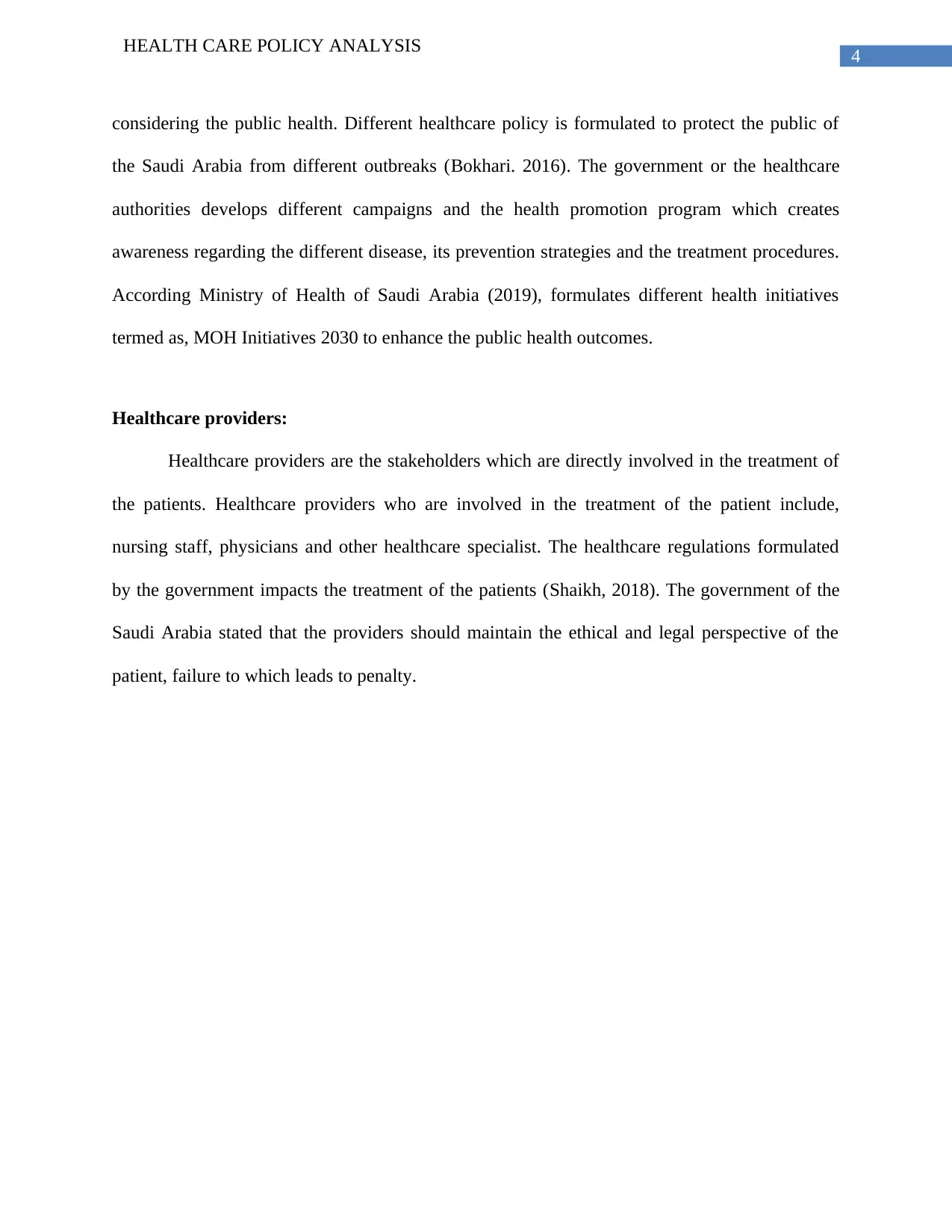
4
HEALTH CARE POLICY ANALYSIS
considering the public health. Different healthcare policy is formulated to protect the public of
the Saudi Arabia from different outbreaks (Bokhari. 2016). The government or the healthcare
authorities develops different campaigns and the health promotion program which creates
awareness regarding the different disease, its prevention strategies and the treatment procedures.
According Ministry of Health of Saudi Arabia (2019), formulates different health initiatives
termed as, MOH Initiatives 2030 to enhance the public health outcomes.
Healthcare providers:
Healthcare providers are the stakeholders which are directly involved in the treatment of
the patients. Healthcare providers who are involved in the treatment of the patient include,
nursing staff, physicians and other healthcare specialist. The healthcare regulations formulated
by the government impacts the treatment of the patients (Shaikh, 2018). The government of the
Saudi Arabia stated that the providers should maintain the ethical and legal perspective of the
patient, failure to which leads to penalty.
HEALTH CARE POLICY ANALYSIS
considering the public health. Different healthcare policy is formulated to protect the public of
the Saudi Arabia from different outbreaks (Bokhari. 2016). The government or the healthcare
authorities develops different campaigns and the health promotion program which creates
awareness regarding the different disease, its prevention strategies and the treatment procedures.
According Ministry of Health of Saudi Arabia (2019), formulates different health initiatives
termed as, MOH Initiatives 2030 to enhance the public health outcomes.
Healthcare providers:
Healthcare providers are the stakeholders which are directly involved in the treatment of
the patients. Healthcare providers who are involved in the treatment of the patient include,
nursing staff, physicians and other healthcare specialist. The healthcare regulations formulated
by the government impacts the treatment of the patients (Shaikh, 2018). The government of the
Saudi Arabia stated that the providers should maintain the ethical and legal perspective of the
patient, failure to which leads to penalty.
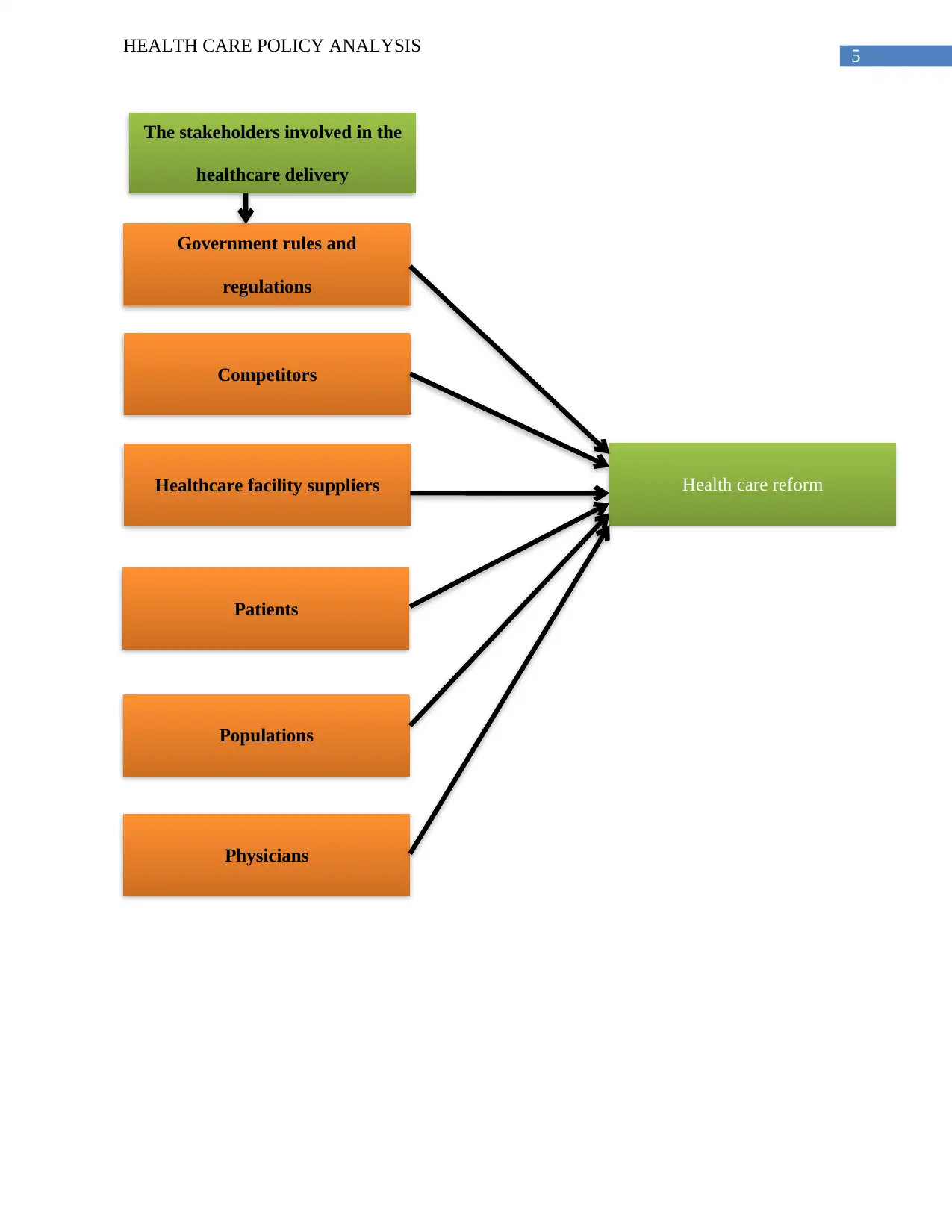
5
HEALTH CARE POLICY ANALYSIS
The stakeholders involved in the
healthcare delivery
Health care reform
Physicians
Populations
Patients
Healthcare facility suppliers
Competitors
Government rules and
regulations
HEALTH CARE POLICY ANALYSIS
The stakeholders involved in the
healthcare delivery
Health care reform
Physicians
Populations
Patients
Healthcare facility suppliers
Competitors
Government rules and
regulations
⊘ This is a preview!⊘
Do you want full access?
Subscribe today to unlock all pages.

Trusted by 1+ million students worldwide
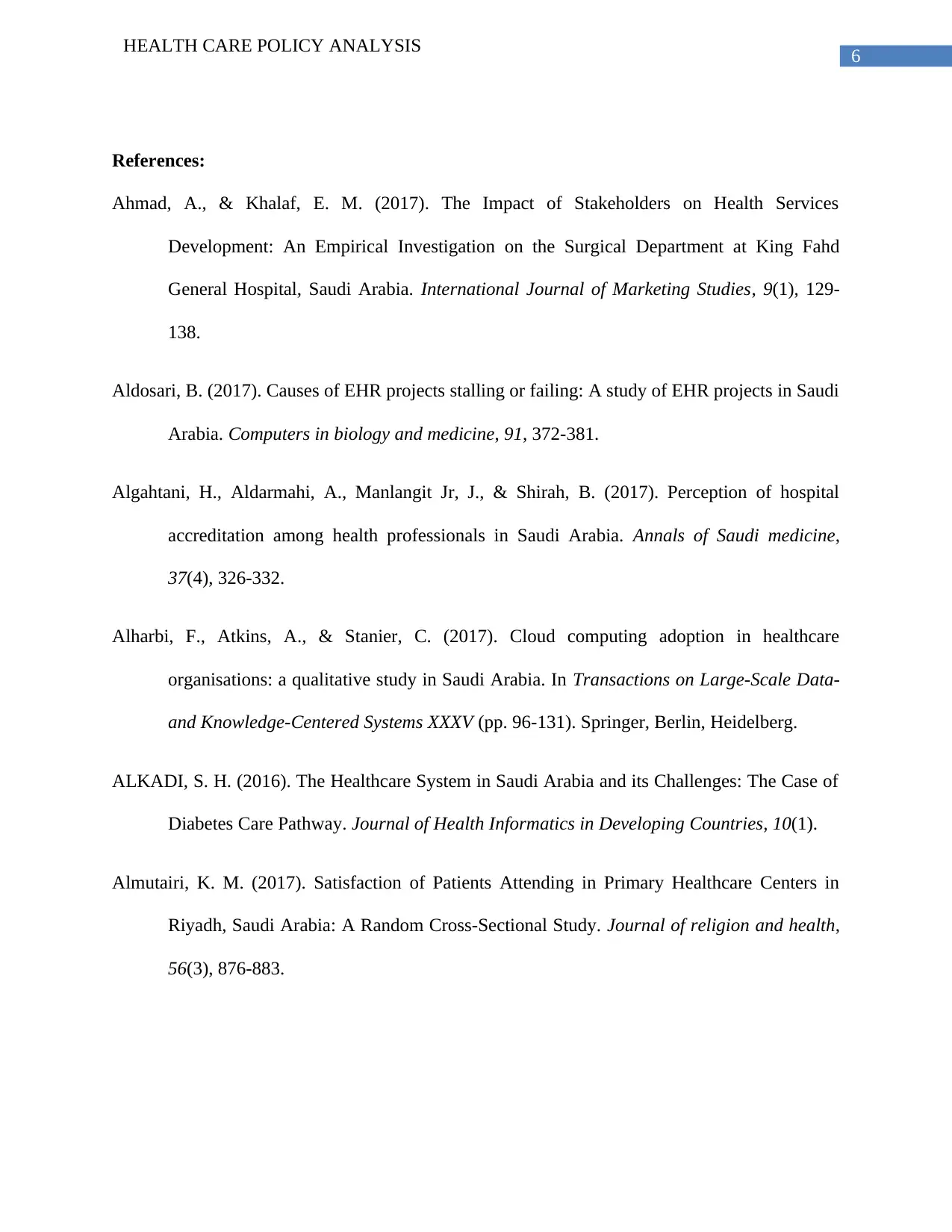
6
HEALTH CARE POLICY ANALYSIS
References:
Ahmad, A., & Khalaf, E. M. (2017). The Impact of Stakeholders on Health Services
Development: An Empirical Investigation on the Surgical Department at King Fahd
General Hospital, Saudi Arabia. International Journal of Marketing Studies, 9(1), 129-
138.
Aldosari, B. (2017). Causes of EHR projects stalling or failing: A study of EHR projects in Saudi
Arabia. Computers in biology and medicine, 91, 372-381.
Algahtani, H., Aldarmahi, A., Manlangit Jr, J., & Shirah, B. (2017). Perception of hospital
accreditation among health professionals in Saudi Arabia. Annals of Saudi medicine,
37(4), 326-332.
Alharbi, F., Atkins, A., & Stanier, C. (2017). Cloud computing adoption in healthcare
organisations: a qualitative study in Saudi Arabia. In Transactions on Large-Scale Data-
and Knowledge-Centered Systems XXXV (pp. 96-131). Springer, Berlin, Heidelberg.
ALKADI, S. H. (2016). The Healthcare System in Saudi Arabia and its Challenges: The Case of
Diabetes Care Pathway. Journal of Health Informatics in Developing Countries, 10(1).
Almutairi, K. M. (2017). Satisfaction of Patients Attending in Primary Healthcare Centers in
Riyadh, Saudi Arabia: A Random Cross-Sectional Study. Journal of religion and health,
56(3), 876-883.
HEALTH CARE POLICY ANALYSIS
References:
Ahmad, A., & Khalaf, E. M. (2017). The Impact of Stakeholders on Health Services
Development: An Empirical Investigation on the Surgical Department at King Fahd
General Hospital, Saudi Arabia. International Journal of Marketing Studies, 9(1), 129-
138.
Aldosari, B. (2017). Causes of EHR projects stalling or failing: A study of EHR projects in Saudi
Arabia. Computers in biology and medicine, 91, 372-381.
Algahtani, H., Aldarmahi, A., Manlangit Jr, J., & Shirah, B. (2017). Perception of hospital
accreditation among health professionals in Saudi Arabia. Annals of Saudi medicine,
37(4), 326-332.
Alharbi, F., Atkins, A., & Stanier, C. (2017). Cloud computing adoption in healthcare
organisations: a qualitative study in Saudi Arabia. In Transactions on Large-Scale Data-
and Knowledge-Centered Systems XXXV (pp. 96-131). Springer, Berlin, Heidelberg.
ALKADI, S. H. (2016). The Healthcare System in Saudi Arabia and its Challenges: The Case of
Diabetes Care Pathway. Journal of Health Informatics in Developing Countries, 10(1).
Almutairi, K. M. (2017). Satisfaction of Patients Attending in Primary Healthcare Centers in
Riyadh, Saudi Arabia: A Random Cross-Sectional Study. Journal of religion and health,
56(3), 876-883.
Paraphrase This Document
Need a fresh take? Get an instant paraphrase of this document with our AI Paraphraser
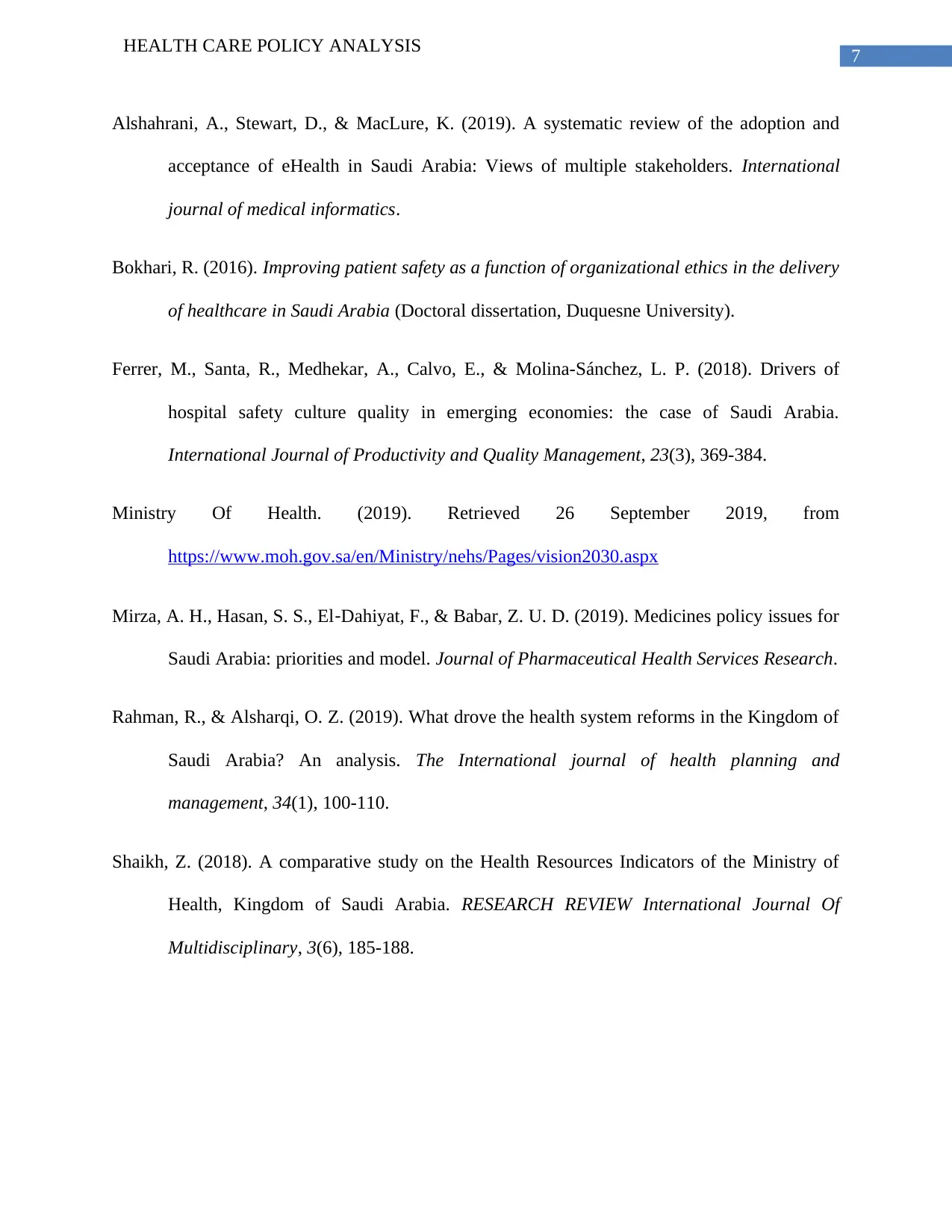
7
HEALTH CARE POLICY ANALYSIS
Alshahrani, A., Stewart, D., & MacLure, K. (2019). A systematic review of the adoption and
acceptance of eHealth in Saudi Arabia: Views of multiple stakeholders. International
journal of medical informatics.
Bokhari, R. (2016). Improving patient safety as a function of organizational ethics in the delivery
of healthcare in Saudi Arabia (Doctoral dissertation, Duquesne University).
Ferrer, M., Santa, R., Medhekar, A., Calvo, E., & Molina-Sánchez, L. P. (2018). Drivers of
hospital safety culture quality in emerging economies: the case of Saudi Arabia.
International Journal of Productivity and Quality Management, 23(3), 369-384.
Ministry Of Health. (2019). Retrieved 26 September 2019, from
https://www.moh.gov.sa/en/Ministry/nehs/Pages/vision2030.aspx
Mirza, A. H., Hasan, S. S., El‐Dahiyat, F., & Babar, Z. U. D. (2019). Medicines policy issues for
Saudi Arabia: priorities and model. Journal of Pharmaceutical Health Services Research.
Rahman, R., & Alsharqi, O. Z. (2019). What drove the health system reforms in the Kingdom of
Saudi Arabia? An analysis. The International journal of health planning and
management, 34(1), 100-110.
Shaikh, Z. (2018). A comparative study on the Health Resources Indicators of the Ministry of
Health, Kingdom of Saudi Arabia. RESEARCH REVIEW International Journal Of
Multidisciplinary, 3(6), 185-188.
HEALTH CARE POLICY ANALYSIS
Alshahrani, A., Stewart, D., & MacLure, K. (2019). A systematic review of the adoption and
acceptance of eHealth in Saudi Arabia: Views of multiple stakeholders. International
journal of medical informatics.
Bokhari, R. (2016). Improving patient safety as a function of organizational ethics in the delivery
of healthcare in Saudi Arabia (Doctoral dissertation, Duquesne University).
Ferrer, M., Santa, R., Medhekar, A., Calvo, E., & Molina-Sánchez, L. P. (2018). Drivers of
hospital safety culture quality in emerging economies: the case of Saudi Arabia.
International Journal of Productivity and Quality Management, 23(3), 369-384.
Ministry Of Health. (2019). Retrieved 26 September 2019, from
https://www.moh.gov.sa/en/Ministry/nehs/Pages/vision2030.aspx
Mirza, A. H., Hasan, S. S., El‐Dahiyat, F., & Babar, Z. U. D. (2019). Medicines policy issues for
Saudi Arabia: priorities and model. Journal of Pharmaceutical Health Services Research.
Rahman, R., & Alsharqi, O. Z. (2019). What drove the health system reforms in the Kingdom of
Saudi Arabia? An analysis. The International journal of health planning and
management, 34(1), 100-110.
Shaikh, Z. (2018). A comparative study on the Health Resources Indicators of the Ministry of
Health, Kingdom of Saudi Arabia. RESEARCH REVIEW International Journal Of
Multidisciplinary, 3(6), 185-188.
1 out of 8
Related Documents
Your All-in-One AI-Powered Toolkit for Academic Success.
+13062052269
info@desklib.com
Available 24*7 on WhatsApp / Email
![[object Object]](/_next/static/media/star-bottom.7253800d.svg)
Unlock your academic potential
© 2024 | Zucol Services PVT LTD | All rights reserved.





